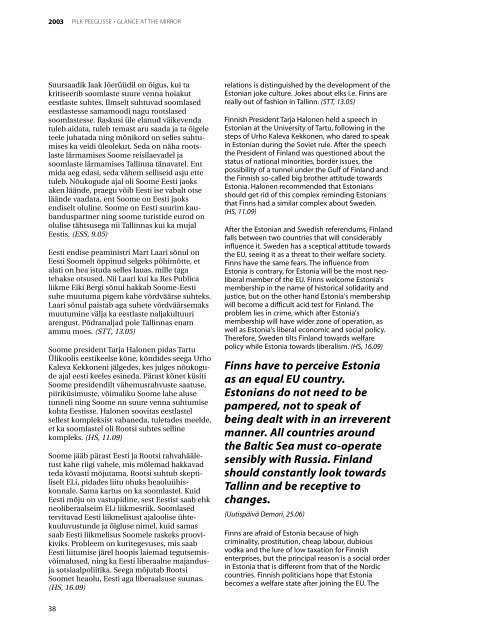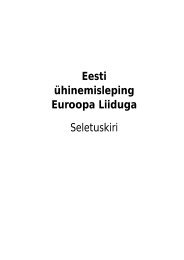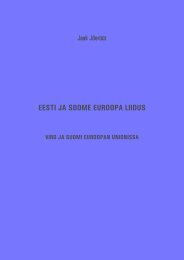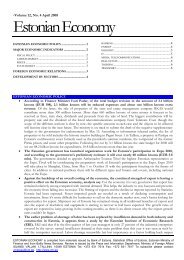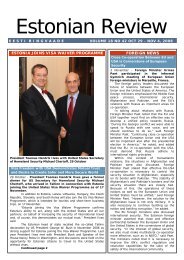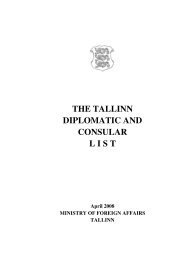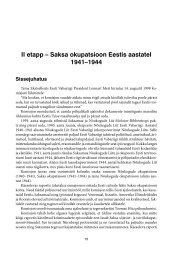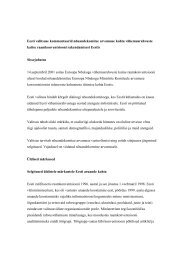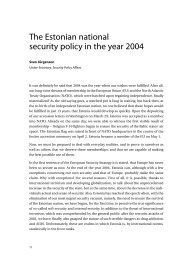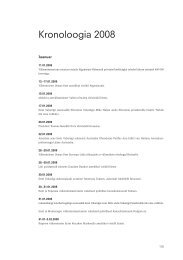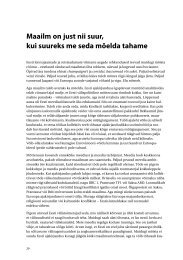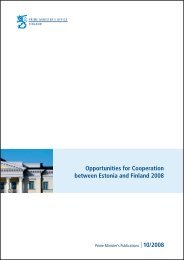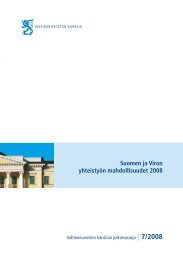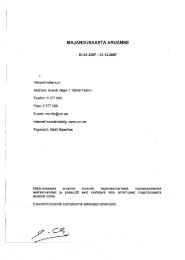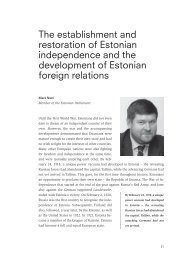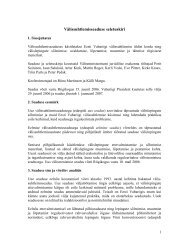Eesti suhted naabritega - Välisministeerium
Eesti suhted naabritega - Välisministeerium
Eesti suhted naabritega - Välisministeerium
Create successful ePaper yourself
Turn your PDF publications into a flip-book with our unique Google optimized e-Paper software.
2003 PILK PEEGLISSE • GLANCE AT THE MIRROR<br />
Suursaadik Jaak Jõerüüdil on õigus, kui ta<br />
kritiseerib soomlaste suure venna hoiakut<br />
eestlaste suhtes. Ilmselt suhtuvad soomlased<br />
eestlastesse samamoodi nagu rootslased<br />
soomlastesse. Raskusi üle elanud väikevenda<br />
tuleb aidata, tuleb temast aru saada ja ta õigele<br />
teele juhatada ning mõnikord on selles suhtumises<br />
ka veidi üleolekut. Seda on näha rootslaste<br />
lärmamises Soome reisilaevadel ja<br />
soomlaste lärmamises Tallinna tänavatel. Ent<br />
mida aeg edasi, seda vähem selliseid asju ette<br />
tuleb. Nõukogude ajal oli Soome <strong>Eesti</strong> jaoks<br />
aken läände, praegu võib <strong>Eesti</strong> ise vabalt otse<br />
läände vaadata, ent Soome on <strong>Eesti</strong> jaoks<br />
endiselt oluline. Soome on <strong>Eesti</strong> suurim kaubanduspartner<br />
ning soome turistide eurod on<br />
olulise tähtsusega nii Tallinnas kui ka mujal<br />
<strong>Eesti</strong>s. (ESS, 9.05)<br />
<strong>Eesti</strong> endise peaministri Mart Laari sõnul on<br />
<strong>Eesti</strong> Soomelt õppinud selgeks põhimõtte, et<br />
alati on hea istuda selles lauas, mille taga<br />
tehakse otsused. Nii Laari kui ka Res Publica<br />
liikme Eiki Bergi sõnul hakkab Soome-<strong>Eesti</strong><br />
suhe muutuma pigem kahe võrdväärse suhteks.<br />
Laari sõnul paistab aga suhete võrdväärsemaks<br />
muutumine välja ka eestlaste naljakultuuri<br />
arengust. Põdranaljad pole Tallinnas enam<br />
ammu moes. (STT, 13.05)<br />
Soome president Tarja Halonen pidas Tartu<br />
Ülikoolis eestikeelse kõne, kõndides seega Urho<br />
Kaleva Kekkoneni jälgedes, kes julges nõukogude<br />
ajal eesti keeles esineda. Pärast kõnet küsiti<br />
Soome presidendilt vähemusrahvuste saatuse,<br />
piiriküsimuste, võimaliku Soome lahe aluse<br />
tunneli ning Soome nn suure venna suhtumise<br />
kohta <strong>Eesti</strong>sse. Halonen soovitas eestlastel<br />
sellest kompleksist vabaneda, tuletades meelde,<br />
et ka soomlastel oli Rootsi suhtes selline<br />
kompleks. (HS, 11.09)<br />
Soome jääb pärast <strong>Eesti</strong> ja Rootsi rahvahääletust<br />
kahe riigi vahele, mis mõlemad hakkavad<br />
teda kõvasti mõjutama. Rootsi suhtub skeptiliselt<br />
ELi, pidades liitu ohuks heaoluühiskonnale.<br />
Sama kartus on ka soomlastel. Kuid<br />
<strong>Eesti</strong> mõju on vastupidine, sest <strong>Eesti</strong>st saab ehk<br />
neoliberaalseim ELi liikmesriik. Soomlased<br />
tervitavad <strong>Eesti</strong> liikmelisust ajaloolise ühtekuuluvustunde<br />
ja õigluse nimel, kuid samas<br />
saab <strong>Eesti</strong> liikmelisus Soomele raskeks proovikiviks.<br />
Probleem on kuritegevuses, mis saab<br />
<strong>Eesti</strong> liitumise järel hoopis laiemad tegutsemisvõimalused,<br />
ning ka <strong>Eesti</strong> liberaalne majandusja<br />
sotsiaalpoliitika. Seega mõjutab Rootsi<br />
Soomet heaolu, <strong>Eesti</strong> aga liberaalsuse suunas.<br />
(HS, 16.09)<br />
relations is distinguished by the development of the<br />
Estonian joke culture. Jokes about elks i.e. Finns are<br />
really out of fashion in Tallinn. (STT, 13.05)<br />
Finnish President Tarja Halonen held a speech in<br />
Estonian at the University of Tartu, following in the<br />
steps of Urho Kaleva Kekkonen, who dared to speak<br />
in Estonian during the Soviet rule. After the speech<br />
the President of Finland was questioned about the<br />
status of national minorities, border issues, the<br />
possibility of a tunnel under the Gulf of Finland and<br />
the Finnish so-called big brother attitude towards<br />
Estonia. Halonen recommended that Estonians<br />
should get rid of this complex reminding Estonians<br />
that Finns had a similar complex about Sweden.<br />
(HS, 11.09)<br />
After the Estonian and Swedish referendums, Finland<br />
falls between two countries that will considerably<br />
influence it. Sweden has a sceptical attitude towards<br />
the EU, seeing it as a threat to their welfare society.<br />
Finns have the same fears. The influence from<br />
Estonia is contrary, for Estonia will be the most neoliberal<br />
member of the EU. Finns welcome Estonia's<br />
membership in the name of historical solidarity and<br />
justice, but on the other hand Estonia's membership<br />
will become a difficult acid test for Finland. The<br />
problem lies in crime, which after Estonia's<br />
membership will have wider zone of operation, as<br />
well as Estonia's liberal economic and social policy.<br />
Therefore, Sweden tilts Finland towards welfare<br />
policy while Estonia towards liberalism. (HS, 16.09)<br />
Finns have to perceive Estonia<br />
as an equal EU country.<br />
Estonians do not need to be<br />
pampered, not to speak of<br />
being dealt with in an irreverent<br />
manner. All countries around<br />
the Baltic Sea must co-operate<br />
sensibly with Russia. Finland<br />
should constantly look towards<br />
Tallinn and be receptive to<br />
changes.<br />
(Uutispäivä Demari, 25.06)<br />
Finns are afraid of Estonia because of high<br />
criminality, prostitution, cheap labour, dubious<br />
vodka and the lure of low taxation for Finnish<br />
enterprises, but the principal reason is a social order<br />
in Estonia that is different from that of the Nordic<br />
countries. Finnish politicians hope that Estonia<br />
becomes a welfare state after joining the EU. The<br />
38


